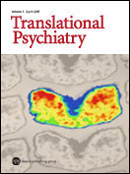
瑞士日内瓦大学一些精神病遗传学研究人员12日发布研究报告,称人类在童年时如果受到严重虐待,会导致某些基因变化。
研究人员以101名显现边缘性综合征的成年人为研究对象,发现那些童年时期遭受过精神、身体或性虐待的人,关联情绪控制的基因出现变化的比例较高。
边缘性综合征的征象为情绪不稳定、易冲动、不合群。
研究人员认为,受虐不会直接导致基因变化,但会引起某些分子附着在基因上,使基因发生变化。受虐程度越高,基因变化越大。
报告的主要作者纳迪尔•佩罗德说,这项研究同样适用于那些经历过自然灾害等强压力的人。
报告12日刊登在医学杂志《转化精神病学》(Translational Psychiatry)上。

 Increased methylation of glucocorticoid receptor gene (NR3C1) in adults with a history of childhood maltreatment: a link with the severity and type of trauma
Increased methylation of glucocorticoid receptor gene (NR3C1) in adults with a history of childhood maltreatment: a link with the severity and type of trauma
N Perroud, A Paoloni-Giacobino, P Prada, E Olié, A Salzmann, R Nicastro, S Guillaume, D Mouthon, C Stouder, K Dieben, P Huguelet, P Courtet and A Malafosse
Childhood maltreatment, through epigenetic modification of the glucocorticoid receptor gene (NR3C1), influences the hypothalamic–pituitary–adrenal axis (HPA axis). We investigated whether childhood maltreatment and its severity were associated with increased methylation of the exon 1F NR3C1 promoter, in 101 borderline personality disorder (BPD) and 99 major depressive disorder (MDD) subjects with, respectively, a high and low rate of childhood maltreatment, and 15 MDD subjects with comorbid post-traumatic stress disorder (PTSD). Childhood sexual abuse, its severity and the number of type of maltreatments positively correlated with NR3C1 methylation (P=6.16 × 10−8, 5.18 × 10−7 and 1.25 × 10−9, respectively). In BPD, repetition of abuses and sexual abuse with penetration correlated with a higher methylation percentage. Peripheral blood might therefore serve as a proxy for environmental effects on epigenetic processes. These findings suggest that early life events may permanently impact on the HPA axis though epigenetic modifications of the NR3C1. This is a mechanism by which childhood maltreatment may lead to adulthood psychopathology.
文献链接:https://www.biodiscover.com/news/biochemistry/library/10945.html







